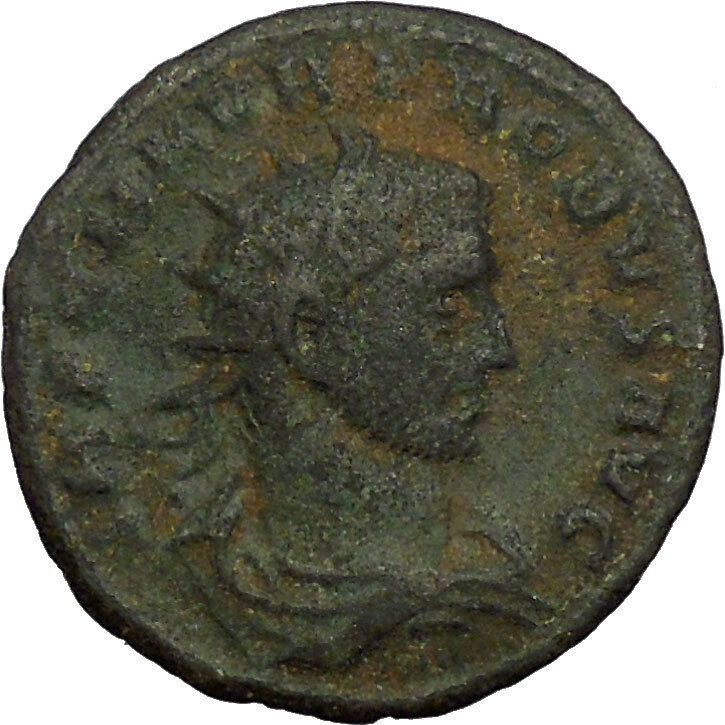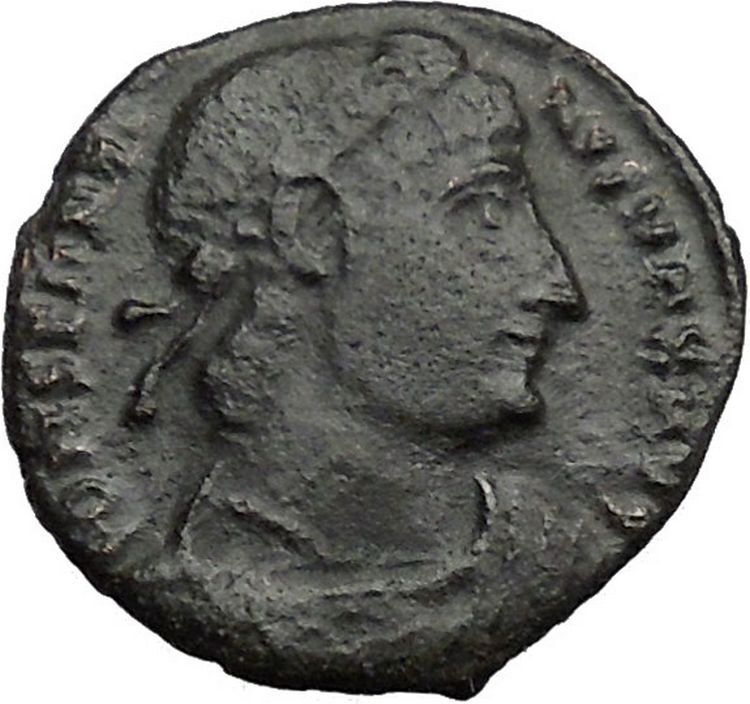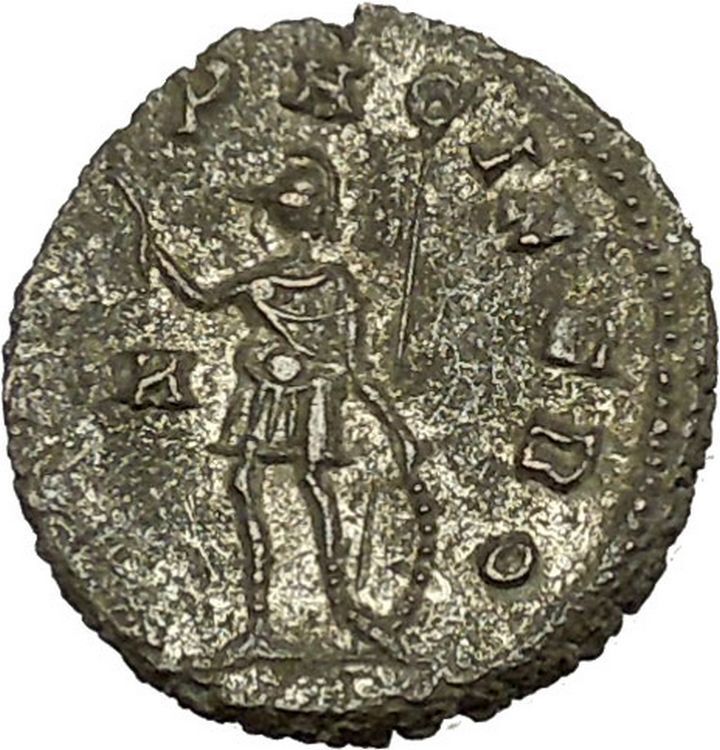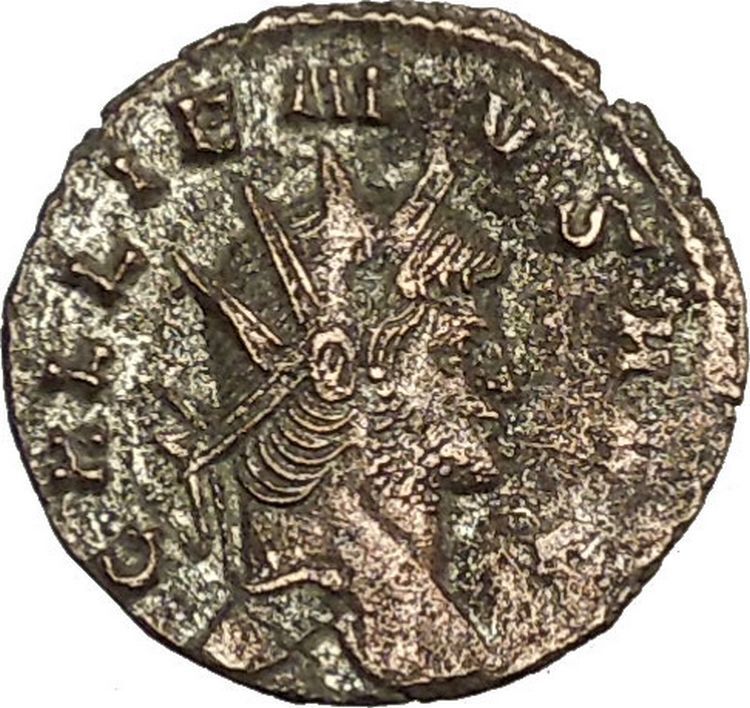|
Magnia Urbica – Roman Empress: 283-285 A.D.
Wife of Carinus
Bronze Antoninianus 22mm (5.13 grams) Ticinum mint
Reference: RIC 347; RCV III 12423 (this coin)
Certification: NGC Ancients Ch AU Strike: 4/5 Surface: 4/5 2077743-001
Pedigree: Ex NFA XXVII (5 Decmber 1991), 177; Ex NFA XX (10 March 1988), 445.
MAGNIA VRBICA AVG, diademed and draped bust of Magnia Urbica right, resting on a crescent.
VENVS VICTRIX / T/SXXI, Venus standing facing, head left, holding crested helmet and transverse scepter; at her feet; shield.
Not much is know about Magnia Urbica other than her being the wife of Carinus.
You are bidding on the exact item pictured, provided with a Certificate of Authenticity and Lifetime Guarantee of Authenticity.
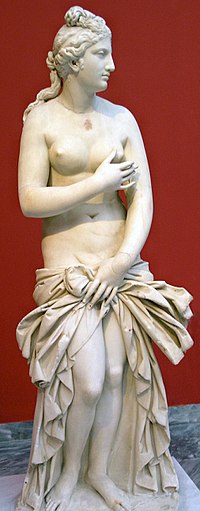 Venus was a Roman goddess principally associated with love, beauty and fertility, who played a key role in many Roman religious festivals and myths. From the third century BC, the increasing Hellenization of Roman upper classes identified her as the equivalent of the Greek goddess Aphrodite. Venus was a Roman goddess principally associated with love, beauty and fertility, who played a key role in many Roman religious festivals and myths. From the third century BC, the increasing Hellenization of Roman upper classes identified her as the equivalent of the Greek goddess Aphrodite.
Her cult began in Ardea and Lavinium, Latium. On August 15, 293 BC, her oldest known temple was dedicated, and August 18 became a festival called the Vinalia Rustica. After Rome’s defeat at the Battle of Lake Trasimene in the opening episodes of the Second Punic War, the Sibylline oracle recommended the importation of the Sicillian Venus of Eryx; a temple to her was dedicated on the Capitoline Hill in 217 BC: a second temple to her was dedicated in 181 BC.
Venus seems to have played a part in household or private religion of some Romans. Julius Caesar claimed her as an ancestor (Venus Genetrix); possibly a long-standing family tradition, certainly one adopted as such by his heir Augustus. Venus statuettes have been found in quite ordinary household shrines (lararia). In fiction, Petronius places one among the Lares of the freedman Trimalchio’s household shrine.
Magnia Urbica
Augusta, 283-285
| Wife of Carinus | Mother(?) of Nigrinian | Daughter-in-law of Carus | Sister-in-law of Numerian |
 Carinus (Latin: Marcus Aurelius Carinus Augustus; died 285) was Roman Emperor from 283 to 285. The elder son of emperor Carus, he was first appointed Caesar and in the beginning of 283 co-emperor of the western portion of the empire by his father. Official accounts of his character and career have been filtered through the propaganda of his successful opponent, Diocletian. Carinus (Latin: Marcus Aurelius Carinus Augustus; died 285) was Roman Emperor from 283 to 285. The elder son of emperor Carus, he was first appointed Caesar and in the beginning of 283 co-emperor of the western portion of the empire by his father. Official accounts of his character and career have been filtered through the propaganda of his successful opponent, Diocletian.
Reign
He fought with success against the Germanic Quadi tribes, but soon left the defence of the Upper Rhine to his legates and returned to Rome, where the surviving accounts, which demonize him, assert that he abandoned himself to all kinds of debauchery and excess. More certainly, he celebrated the annual ludi Romani on a scale of unexampled magnificence.
After the death of Carus, the army in the east demanded to return to Europe, and Numerian, the younger son of Carus, was forced to comply. During a halt at Chalcedon, Numerian was found dead. Diocletian, commander of the body-guards, claimed that Numerian had been assassinated, and he was proclaimed emperor by the soldiers.
Carinus left Rome at once and set out for the east to meet Diocletian. On his way through Pannonia he put down the usurper Sabinus Julianus and in July 285 he encountered the army of Diocletian at the Margus River in Moesia.
Death in 285
Historians differ on what then ensued. At the Battle of the Margus River (Morava), according to one account, the valour of his troops had gained the day, but Carinus was assassinated by a tribune whose wife he had seduced. Another account represents the battle as resulting in a complete victory for Diocletian, and claims that Carinus’ army deserted him. This account may be confirmed by the fact that Diocletian kept in service Carinus’ Praetorian Guard commander, Titus Claudius Aurelius Aristobulus.
Character
Carinus has a reputation as one of the worst Roman emperors. This infamy may have been supported by Diocletian himself. For example, the (unreliable) Historia Augusta has Carinus marrying nine wives, while neglecting to mention his only real wife, Magnia Urbica, by whom he had a son, Marcus Aurelius Nigrinianus.
After his death, Carinus’ memory was officially condemned in the Roman proceeding known as Damnatio Memoriae. His name, along with that of his wife, was erased from inscriptions.
|








 Venus was a Roman goddess principally associated with love, beauty and fertility, who played a key role in many Roman religious festivals and myths. From the third century BC, the increasing Hellenization of Roman upper classes identified her as the equivalent of the Greek goddess Aphrodite.
Venus was a Roman goddess principally associated with love, beauty and fertility, who played a key role in many Roman religious festivals and myths. From the third century BC, the increasing Hellenization of Roman upper classes identified her as the equivalent of the Greek goddess Aphrodite. Carinus (Latin: Marcus Aurelius Carinus Augustus; died 285) was Roman Emperor from 283 to 285. The elder son of emperor Carus, he was first appointed Caesar and in the beginning of 283 co-emperor of the western portion of the empire by his father. Official accounts of his character and career have been filtered through the propaganda of his successful opponent, Diocletian.
Carinus (Latin: Marcus Aurelius Carinus Augustus; died 285) was Roman Emperor from 283 to 285. The elder son of emperor Carus, he was first appointed Caesar and in the beginning of 283 co-emperor of the western portion of the empire by his father. Official accounts of his character and career have been filtered through the propaganda of his successful opponent, Diocletian.

